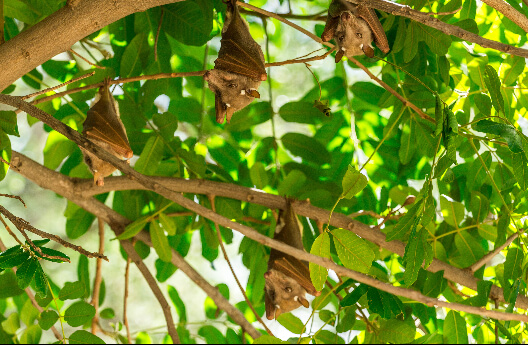Why Do Some Bats Hunt During the Day?

About 54 million years ago, scientists tell us that bats became nocturnal hunters and became night dwellers. Currently, 1400 species of bats have been certified and catalogued and only 4 of them have diurnal habits. So, why do some bats hunt during the day? We’re going to discover the answer in today’s article! Don’t miss it!
When do bats hunt?
A species of bat that hunts during the day and sleeps at night is an exception to the rule in the bat kingdom.
Until a few years ago, the question that various theories and hypotheses were trying to resolve was why and how bats became nocturnal. Experts tell us that this flying mammal evolved from earlier species that hunted by day and slept at night.
But at some evolutionary point, for an elusive reason that scientists are currently trying to resolve, the bat switched to nocturnal habits and developed echolocation, which is better than sight.
So a bat species that hunts by day and sleeps at night is an exception to the rule of most of the rest of its relatives. But that’s beginning to change, even in areas that aren’t remote islands with no known dangers.
Better hunting at night, depending on the environment
Among the various reasons for the bat’s nocturnality are:
- Low tolerance to high temperatures in tropical climates, since their wings can be damaged by direct sunlight.
- Avoiding predators, including birds such as hawks, which have diurnal hunting habits.
- Their diet – based on fruits and insects (that increase their activity at night).
So, by finding only 4 species of bats that hunt during the day, it has become possible to test the theories. Experts only needed to observe which of the list of reasons listed were present in the environments of the diurnal species.

The diurnal bats that live on islands
In the region of Pahang, Malaysia, on the island of Tioman, the species Rhinolophus lepidus was observed hunting insects during the day. This was the fourth species and they all share a common characteristic: they live on tropical islands and have no predators during the day.
In this way, they have dismantled the hypothesis that they became nocturnal due to low heat tolerance. Although they avoid the hottest times of the day (like almost all animals in hot areas), they hunt in the early hours of the morning and their wings aren’t damaged at all by the sun’s rays.
Only the Samoa flying fox (Pteropus samoensis) of the island of the same name – a large bat that hunts during the day – avoids going out in full sun so as not to expose itself to the local hawks. But it does hunt at dusk when there’s still sunlight.
The bat that dares to hunt during the day
The soprano pipistrelle (Pipistrellus pygmaeus) is a species that can be seen both during the day and at night. Sighted in a beech forest in Italy, they venture into the light to feed on mosquitoes. This has been the subject of study by the scientific community, as it’s a species that has always been considered nocturnal.
With a length of 5 centimeters (2 inches) and a weight of 8 grams (0.3 oz), the small bat needs to recover the energy lost during the winter. It comes out of hibernation without fear of danger, and hunts in an area at the bottom of a canyon. This serves as protection and shelter from predators.
It’s believed that if local populations of this species increase, a change in their hunting habits may be observed. This is because mosquito populations in the forests have also increased, due to the change in temperatures over the last century.
All cited sources were thoroughly reviewed by our team to ensure their quality, reliability, currency, and validity. The bibliography of this article was considered reliable and of academic or scientific accuracy.
- National Geographic. (2017, 16 octubre). National Geographic. www.nationalgeographic.com.es. https://www.nationalgeographic.com.es/ciencia/grandes-reportajes/la-llamada-de-la-flor-2_8154/7
- Orozco-Lugo, L. (2013). Descripción de los pulsos de ecolocalización de once especies de murciélagos insectívoros aéreos de una selva baja caducifolia en Morelos, México. SciELO. http://www.scielo.org.mx/scielo.php?script=sci_arttext&pid=S2007-33642013000100004
- EcuRed. (s. f.). Murciélago Artibeus jamaicensis – EcuRed. Recuperado 2 de agosto de 2021, de https://www.ecured.cu/Murci%C3%A9lago_Artibeus_jamaicensis
- FAVIC, M., Yung, V., Pavletic, C., Ramirez, E., De Mattos, C., & De Mattos, C. A. (1999). Rol de los murciélagos insectívoros en la transmisión de la rabia en Chile. Archivos de medicina veterinaria, 31(2), 157-165.
This text is provided for informational purposes only and does not replace consultation with a professional. If in doubt, consult your specialist.